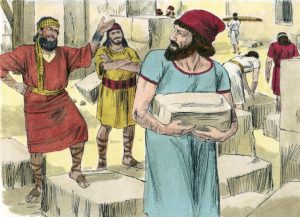Handling your Sanballat and Tobiah (2) By Babatunde Olugboji
This week, we will continue the series on Sanballat and Tobiah, two of those recorded as discouraging Nehemiah as he sought to rebuild the walls and gates of Jerusalem.
On virtually every page, Sanballat and Tobiah re-entered the picture in an almost universally negative way.
• In Nehemiah 4:11-12, they threatened to kill the workers.
• In Nehemiah 6:1-2, they asked Nehemiah to meet up so they could ambush him.
• In Nehemiah 6:6-8, they stirred up false rumors as to Nehemiah’s loyalty and planned to send letters throughout the empire defaming him.
Often overlooked in the narrative of Nehemiah was the profound emotional impact that his experiences had on his life. Undertaking the mission to advance God’s kingdom was inherently challenging, but the presence of discouragement from those close to him exacerbated the difficulty. This emotional burden can render the pursuit of one’s divine calling nearly insurmountable, as the weight of such discouragement can overshadow the motivation and resolve needed to persevere.
The parallels between Nehemiah’s story and that of Cain and Abel in Genesis 4 are striking. In the biblical account, Cain’s frustration stemmed from the acceptance of Abel’s offering, which starkly contrasted with the rejection of his own. Rather than addressing the issue constructively, as God advised, Cain succumbed to jealousy and rage, ultimately leading him to commit the grave act of murder against his brother. This narrative illustrated the destructive consequences of unresolved emotions and the failure to seek redemption.
The scripture from 1 John 3:12 provides insight into Cain’s motivations, stating, “And for what reason did he slay him? Because his deeds were evil, and his brother’s were righteous.” This succinctly encapsulated the essence of Cain’s actions. Much like Sanballat, who sought to undermine Nehemiah, Cain lacked any genuine intention to honor God. Instead, his focus was solely on eliminating those who exemplified righteousness, driven by a desire to protect his own image rather than to pursue a relationship with the divine.
There’s a lot that we can learn from how Nehemiah accomplished this feat in the face of profound discouragement. The Bible goes through great lengths to demonstrate Nehemiah’s actions, so it is a good idea for us to learn how he handled it.
Nehemiah Prayed. A lot.
A cursory reading of his book will tell you that Nehemiah is a very emotional person. In the first chapter, Nehemiah learned of the plight of Jerusalem and the people that were left, so he prayed fervently to God for two things. First, for God to forgive the people of their sins, and secondly, for God’s help in restoring the city. Every single word of that prayer was recorded and demonstrated a heart that was tenderly devoted to God.
In fact, seven times in the book, Nehemiah prayed a simple prayer: “Remember…oh God.” What he asked God to remember changed every time, but there’s no doubt that Nehemiah trusted that God was watching the whole story unfold.
He exhibited this reliance on God when he spoke to the people in Nehemiah 2:17-20. He reminded them that the only way that they would accomplish this work was through God’s help, and that they should all pray to God on behalf of the city.
Prayer should be a part of our life anyway, but when we’re facing people like Sanballat and Tobiah, our knees should be on the ground even more than usual.
To be continued. Have a great week.
For Questions or comments?
Reach out on (WhatsApp): +1-609 887 6610


